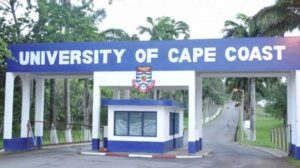IS UCC THE BEST UNIVERSITY IN GHANA

The University of Cape Coast was established in October, 1962 as a University College and placed in a special relationship with the University of Ghana, Legon.
On October 1, 1971, the College attained the status of a full and independent University, with the authority to confer its own degrees, diplomas and certificates by an Act of Parliament – The University of Cape Coast Act, 1971 [Act 390] and subsequently the University of Cape Coast Law, 1992 [PNDC Law 278].
ORIGINAL MANDATE
The University was established out of a dire need for highly qualified and skilled manpower in education. Its original mandate was therefore to train graduate professional teachers for Ghana’s second cycle institutions and the Ministry of Education in order to meet the manpower needs of the country’s accelerated education programme at the time.
Today, with the expansion of some of its Faculties/Schools and the diversification of programs, the University has the capacity to meet the manpower needs of other ministries and industries in the country, besides that of the Ministry of Education.
STUDENT POPULATION
From an initial student enrolment of 155 in 1963, the University of Cape Coast now has a total student population of 74, 720 The breakdown is as follows: 18949 regular undergraduate students, 1445 sandwich undergraduate students, 1014 regular postgraduate students, 2773 sandwich postgraduate students 48989 distance undergraduate students and 1540 postgraduate distance students. The University admitted a total of 24723 students into its various programmes for the 2016/2017 academic year.
PIONEERING DEPARTMENTS
The University started with two departments, namely: Arts and Science. These departments developed into Faculties in 1963. In order to achieve the set objectives, in 1964, the University created two more Faculties, namely: Education and Economics & Social Studies [now Faculty of Social Sciences].
The fifth faculty [School of Agriculture] was established in 1975. The Faculty of Science was split into the Schools of Physical and Biological Sciences during the 2002/2003 academic year while the Department of Business Studies was also elevated to the School of Business with effect from the 2003/2004 academic year.
UCC RANKED THE TOPMOST UNIVERSITY IN GHANA AND WEST AFRICA IN THE 2022 TIMES HIGHER EDUCATION WORLD UNIVERSITIES RANKING. On Thursday 2nd September 2021, Times Higher Education (THE) released the 2022 world ranking of universities.
The ranking this year is unique and historic because this is the first time the University of Cape Coast is ranked. UCC is the highest ranked new entrant out of 138 universities that made their debut on the global universities ranking league table this year.
UCC VISION
- To be a University with worldwide acclaim that is strongly positioned for innovative teaching, research, outreach, and professional development.
UCC MISSION
- The University of Cape Coast is an equal opportunity University uniquely placed to provide quality education through the provision of comprehensive, liberal and professional programs that challenge learners to be creative, innovative and responsible citizens.
UCC CORE VALUES
Excellence: UCC seeks to pursue excellence through the creation of standards in teaching, intellectual inquiry, engagement and professional practice.
Empowerment: UCC offers opportunities to its employees and products in a manner that empowers them to be agents of change.
Equal Opportunities: UCC strives to provide equal opportunity and access to quality education and services to all categories of persons regardless of colour, creed, ethnicity, gender, social status and physical ability.
Ethical behavior: UCC upholds acts of honesty and responsible behavior and holds its members accountable for their actions and conduct in a way that promotes the integrity of the person and the image of the University.




